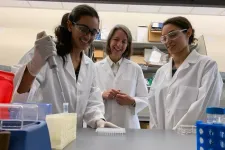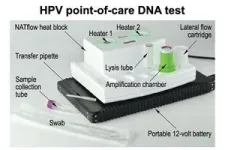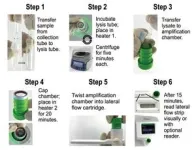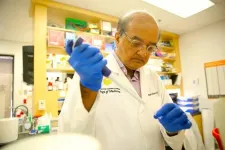HPV, a family of viruses, infects nearly everyone at some point in their lives, often without symptoms. But more than a dozen types of HPV can cause persistent infections that result in cervical cancer, which is preventable and curable if it is detected early and managed effectively.
Nine engineers from the laboratory of Rice Professor Rebecca Richards-Kortum spent more than two years developing a DNA testing platform that combines two technologies, isothermal DNA amplification and lateral flow detection, in a way that greatly simplifies the equipment needs and procedures for testing. In a study published this week in Science Translational Medicine, Richards-Kortum’s team and co-authors from the National Cancer Institute, the Mozambique Ministry of Health, Baylor College of Medicine and the University of Texas MD Anderson Cancer Center showed the platform could produce clinically relevant results on samples collected at both U.S. clinical sites and at clinical field sites in Mozambique.
“We know what we need to do to prevent cervical cancer,” said study first author Kathryn Kundrod, a cancer prevention fellow at the National Cancer Institute and senior advisor for cancer moonshot policy coordination at the White House Office of Science and Technology Policy. “It’s really a matter of access at this point, and that’s one reason this study is exciting from a global health perspective. It demonstrates a testing process that could potentially be combined with point-of-care diagnostic and treatment technologies to allow women who’ve never had access to be screened and treated in a single visit in settings like a small clinic or a mobile diagnostic van.”
In the study, the researchers showed their six-step test for HPV16 and HPV18 — two types that account for about 70% percent of cervical cancer — delivered results in 45 minutes and required just two pieces of equipment. One, a small centrifuge, is widely available for about $500. The other, a purpose-built, dual-chamber heater called NATflow, allowed the researchers to use disposable cartridges to avoid false positives arising from workspace contamination, a major challenge for point-of-care molecular testing.
“The vast majority of disease detected through screening is precancerous, before the point at which people have cancer,” said Richards-Kortum, Rice’s Malcolm Gillis University Professor, professor of bioengineering and the founding director of the Rice360 Institute for Global Health Technologies. “That's why screening programs are so effective. People who are routinely screened very rarely progress to cervical cancer. It’s people who have never been screened in their lives, or who get screened on really infrequent intervals, who are really at risk. That’s why it’s so critical to address the disparities that exist and think about new ways to deliver screening, diagnosis and treatment.”
Kundrod, who received her Ph.D. from Rice in 2020, is a former student and postdoctoral researcher in Richards-Kortum’s lab who led the day-to-day development of the HPV test and the co-development of the platform in conjunction with NATflow manufacturer Axxin of Victoria, Australia. Kundrod said that if both the NATflow platform and test cartridges were produced on a large scale, each dual-chamber heater would cost an estimated $500 and each test less than $5.
“The platform is the other thing that makes this exciting, because it can easily be adapted for DNA tests for other diseases,” she said. “Preventing contamination has been a huge problem for DNA-based point-of-care tests. This is one of the first platforms to address that, and so far it’s the only one to solve that in a way where all the pieces can be easily manufactured with injection molding, which is important from a cost perspective.”
Kundrod said the Rice team’s HPV test won’t be ready for widespread use until researchers modify it to detect more cancer-causing types of HPV and conduct additional clinical tests. She said studies have consistently shown that HPV screening is the most effective way to prevent cervical cancer and DNA testing is the most effective way to screen for HPV infections.
“We’re grateful to the whole team who made this work possible and are committed to continued development and scale in places where cervical cancer screening is most needed,” Richards-Kortum said.
This research was supported by the National Institutes of Health’s National Cancer Institute (CA016672, CA249367), the National Academy of Sciences, the United States Agency for International Development (AID-OAA-A-11-00012), the MD Anderson Multidisciplinary Research Program, the Prevent Cancer Foundation and the National Science Foundation.
-30-
Peer-reviewed paper:
“An integrated isothermal nucleic acid amplification test to detect HPV16 and HPV18 DNA in resource-limited settings” | Science Advances | DOI: 10.1126/scitranslmed.abn4768
Authors: Kathryn A. Kundrod, Maria Barra, Alexis Wilkinson, Chelsey A. Smith, Mary E. Natoli, Megan M. Chang, Jackson B. Coole, Akshaya Santhanaraj, Cesaltina Lorenzoni, Celda Mavume, Hira Atif, Jane Richards Montealegre, Michael E. Scheurer, Philip E. Castle, Kathleen M. Schmeler and Rebecca R. Richards-Kortum
https://doi.org/10.1126/scitranslmed.abn4768
Image downloads:
https://news-network.rice.edu/news/files/2023/06/0626_HPV-KkRrkMn-lg.jpg
CAPTION: From left, Kathryn Kundrod ‘20, Rebecca Richards-Kortum and Mary Natoli ‘20 in Richards-Kortum’s Rice University laboratory in March 2020. Kundrod, Richards-Kortum and Natoli are co-authors on a new study that demonstrated the effectiveness of a low-cost, point-of-care DNA test for HPV infections that could allow for more cervical cancer screening in low- and middle-income countries where the disease kills more than 300,000 women each year. (Photo by Jade Boyd/Rice University)
https://news-network.rice.edu/news/files/2023/06/0626_HPV-POCtest-1080.jpg
CAPTION: A low-cost, point-of-care DNA test for HPV infections that was invented at Rice University delivers results in 45 minutes and requires just two pieces of equipment, a small centrifuge (not shown) that costs about $500 and NATflow, a purpose-built, dual-chamber heater that uses disposable cartridges to prevent false positives arising from workspace contamination, a major challenge in point-of-care molecular testing. (Figure courtesy of Richards-Kortum Lab/Rice University)
https://news-network.rice.edu/news/files/2023/06/0626_HPV-steps-1500.jpg
CAPTION: The six-step process for a new point-of-care DNA test for HPV infections that could allow more access to cervical cancer screening in low- and middle-income countries where the disease kills more than 300,000 women each year. (Figure courtesy of Richards-Kortum Lab/Rice University)
This release can be found online at:
https://news.rice.edu/news/2023/dna-test-could-broaden-access-cervical-cancer-screening
Follow Rice News and Media Relations via Twitter @RiceUNews.
Located on a 300-acre forested campus in Houston, Rice University is consistently ranked among the nation’s top 20 universities by U.S. News & World Report. Rice has highly respected schools of Architecture, Business, Continuing Studies, Engineering, Humanities, Music, Natural Sciences and Social Sciences and is home to the Baker Institute for Public Policy. With 4,240 undergraduates and 3,972 graduate students, Rice’s undergraduate student-to-faculty ratio is just under 6-to-1. Its residential college system builds close-knit communities and lifelong friendships, just one reason why Rice is ranked No. 1 for lots of race/class interaction and No. 4 for quality of life by the Princeton Review. Rice is also rated as a best value among private universities by Kiplinger’s Personal Finance.
END





